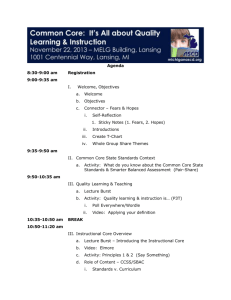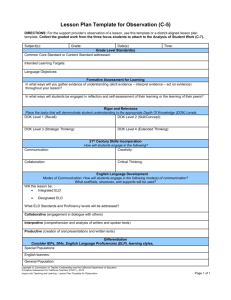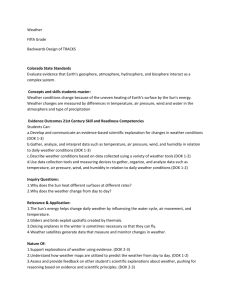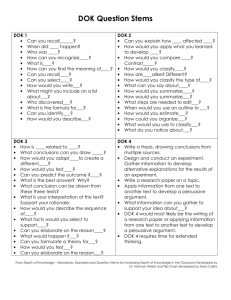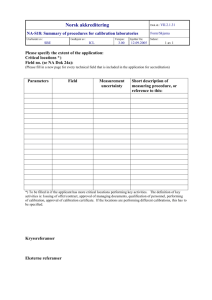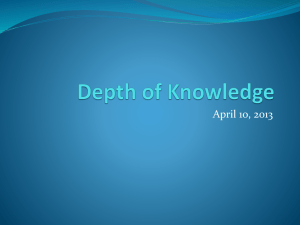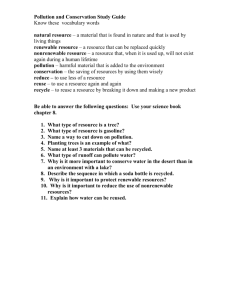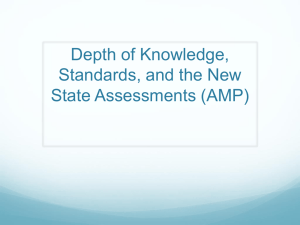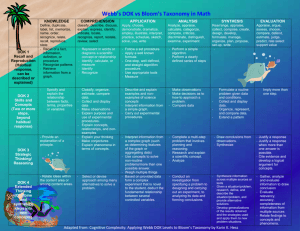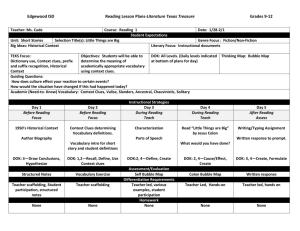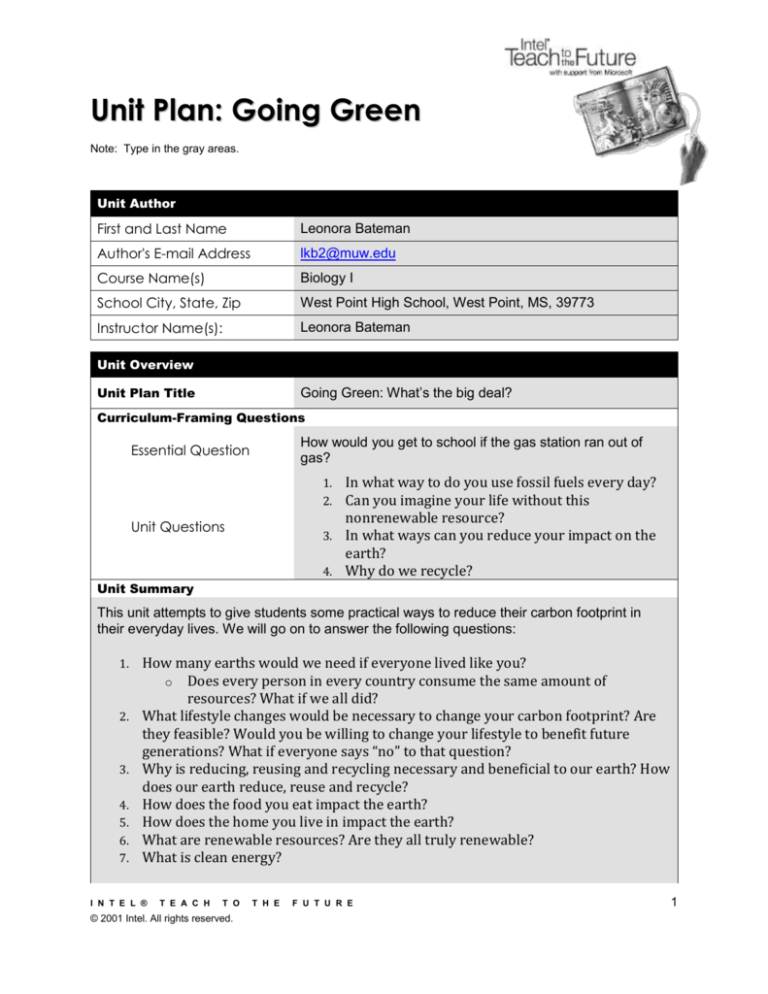
Unit Plan: Going Green
Note: Type in the gray areas.
Unit Author
First and Last Name
Leonora Bateman
Author's E-mail Address
lkb2@muw.edu
Course Name(s)
Biology I
School City, State, Zip
West Point High School, West Point, MS, 39773
Instructor Name(s):
Leonora Bateman
Unit Overview
Unit Plan Title
Going Green: What’s the big deal?
Curriculum-Framing Questions
How would you get to school if the gas station ran out of
gas?
Essential Question
In what way to do you use fossil fuels every day?
Can you imagine your life without this
nonrenewable resource?
3. In what ways can you reduce your impact on the
earth?
4. Why do we recycle?
1.
2.
Unit Questions
Unit Summary
This unit attempts to give students some practical ways to reduce their carbon footprint in
their everyday lives. We will go on to answer the following questions:
1.
2.
3.
4.
5.
6.
7.
How many earths would we need if everyone lived like you?
o Does every person in every country consume the same amount of
resources? What if we all did?
What lifestyle changes would be necessary to change your carbon footprint? Are
they feasible? Would you be willing to change your lifestyle to benefit future
generations? What if everyone says “no” to that question?
Why is reducing, reusing and recycling necessary and beneficial to our earth? How
does our earth reduce, reuse and recycle?
How does the food you eat impact the earth?
How does the home you live in impact the earth?
What are renewable resources? Are they all truly renewable?
What is clean energy?
I N T E L ®
T E A C H
T O
© 2001 Intel. All rights reserved.
T H E
F U T U R E
1
We will also do a small unit on gardening and how to stay green in our garden by establishing
a local, organic food source right in our back (or front!) yards.
Subject Area(s): (List all subjects that apply)
Biology, Life Science, Earth Science, Agriculture, Social Studies
Grade Level (Click boxes of all grade levels that apply)
K-2
6-8
ESL
Gifted and Talented
3-5
9-12
Resource
Other:
Student Objectives/Learning Outcomes
The students will have a broader understanding of their impact on the earth; and how to
decrease their own carbon footprint.
The students will have an appreciation for how their personal choices affect the world around
them.
Targeted State Frameworks/Content Standards/Benchmarks
4d Describe ways to conserve water. (DOK 2)
4d. Categorize types of actions that cause water, air, or land pollution. (DOK 2)
4d. Distinguish how actions or events related to the Earth’s environment may be harmful or helpful.
(DOK 2)
4d. Identify the causes and effects of various types of air, land, and water pollution and infer ways to
protect the environment. (DOK 3)
4d. Describe how human activities have decreased the capacity of the environment to support some
life forms. (DOK 2)
Reducing the amount of forest cover,
Increasing the amount of chemicals released into the atmosphere
Farming intensively
4d. Describe changes caused by humans on the environment and natural resources and cite evidence
from research of ways to conserve natural resources in the United States, including (but not limited to)
Mississippi. Examples of Mississippi efforts include the following: (DOK 2)
Associated Phy-sics of America, a private company located in Greenwood MS, develops ways to
convert agricultural products into environment-friendly and cost-effective energy.
The Natural Resource Enterprises (NRE) Program of the Dept. of Wildlife and Fisheries and
Cooperative Extension Service at MSU educate landowners about sustainable natural resource
enterprises and compatible habitat management practices.
The Vicksburg District of the U.S. Army Corps of Engineer’s Engineer Research and Development
Center provides quality engineering and other professional products and services to develop and
manage the Nation’s water resources, reduce flood damage, and protect the environment
4d. Summarize the causes and effects of pollution on people and the environment (e.g., air pollution,
ground pollution, chemical pollution) and justify how and why pollution should be minimized. (DOK 1)
4d. Research the importance of the conservation of renewable and nonrenewable
resources including (but not limited to) Mississippi, and justify methods that might be useful in
I N T E L ®
T E A C H
T O
© 2001 Intel. All rights reserved.
T H E
F U T U R E
2
decreasing the human impact on global warming. (DOK 3)
Greenhouse gases
The effects of the human population
Relationships of the cycles of water, carbon, oxygen, and nitrogen
4g. Summarize the process that results in deposits of fossil fuels, and conclude why fossil fuels are
classified as nonrenewable resources. (DOK 2)
4g. Conclude that the supply of many Earth resources (e.g., fuels, metals, fresh water, farmland) is
limited and critique a plan to extend the use of Earth’s resources (e.g., recycling, reuse, renewal).
(DOK 3)
4g. Research and cite evidence of current resources in Earth’s systems. (DOK 3)
Resources such as fuels, metals, fresh water, wetlands, and farmlands
Methods being used to extend the use of Earth’s resources through recycling, reuse, and renewal
Factors that contribute to and result from runoff (e.g., water cycle,
ground water,
drainage basin
(watershed)
4g. Research and evaluate the use of renewable and nonrenewable resources and critique efforts in
the United States including (but not limited) to Mississippi to conserve natural resources and reduce
global warming.
(DOK 3)
How materials are reused in a continuous cycle in ecosystems, (e.g., MS Ethanol Gasification
Proj-ect to develop and demonstrate technologies for the conversion of biomass to ethanol)
Benefits of solid waste man-agement (reduce, reuse, recycle)
Conserving renewable and nonrenewable resources (e.g., The Recycling and Solid Waste Reduction
Program in Jackson, MS)
Procedures
Question 1 requires two days in the computer lab to follow tutorial and go to
www.myfootprint.org to find out their carbon footprint. The first day we will go through this quiz
together and the second day in the lab we will research carbon footprints of other countries.
Students will start a recycling program at school.
Question 2 will be presented by Powerpoint by the teacher (prepared and can be viewed as
“presentation 1” on the class website).
Question 3 will involve a field trip to our local landfill and/or recycling center. If no recycling
center exists in the area we will do community outreach to encourage recycling. Research will
be done in the library to find out what process is necessary for recycling to occur. Students
will continue to maintain recycling program at school.
Question 4: two days watching Food, Inc. and a talk by Michael Pollan to take a look at how
mechanized and industrialized the food industry has become. Students will write a paper
about their food choices for a day and find out where that food came from to get to their
tables.
Question 5: 1 day with a guest speaker to discuss home building materials, how long it takes
I N T E L ®
T E A C H
T O
© 2001 Intel. All rights reserved.
T H E
F U T U R E
3
for building materials to break down, what are the worst materials we use for our homes.
What is the most earth-friendly way to live? Students will develop questions for the guest
speaker during the week that we are going to the landfill to look at what happens to our
waste.
Question 6: We will look at what renewable resources are out there and talk to a guest
speaker about wind, solar, or hydrothermal heating, if available in the area. Students will pick
their favorite resource and develop a poster to be put out in the hall.
Question 7: Student will use what they learned about renewable resources the week before
and debate their ideal clean energy.
Garden unit (2 weeks): Students will prepare community garden for planting where they will
maintain their plot for the summer for harvest in the Fall, during Biology II. We will discuss
biological control, organic gardening and do research on the best plants to plant for our
region.
Approximate Time Needed (Example: 45 minutes, 4 hours, 1 year, etc.)
9 week spring quarter with one unit question a week and then a 2 week unit on gardening
which has community involvement.
Prerequisite Skills
Some basic computer research skills
Materials and Resources Required For Unit
Technology – Hardware (Click boxes of all equipment needed.)
Camera
Laser Disk
Computer(s)
Printer
Digital Camera
Projection System
DVD Player
Scanner
Internet Connection
Television
VCR
Video Camera
Video Conferencing Equip.
Other:
Technology – Software (Click boxes of all software needed.)
Database/Spreadsheet
Image Processing
Desktop Publishing
Internet Web Browser
E-mail Software
Multimedia
Encyclopedia on CD-ROM
Web Page Development
Word Processing
Other:
Printed Materials
Since this unit topic is “Going Green” all printed materials
will be available for viewing online, and any paper waste will
be kept to a minimum.
Supplies
Recycle bins, basic gardening tools, school bus for field trip,
Food, Inc. DVD, Special Guest Speakers, community
garden, city dump/recycling center
Internet Resources
Websites listed above in either procedures or framework
Student Assessment
I N T E L ®
T E A C H
T O
© 2001 Intel. All rights reserved.
T H E
F U T U R E
4
Assessments were discussed in the “procedures” section and vary based on unit question.
Page 5 of 5

